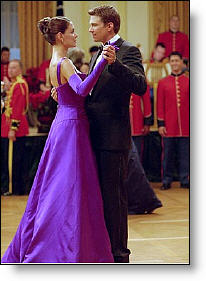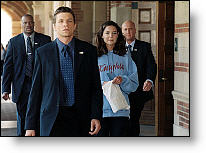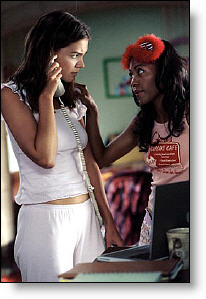First Daughter
 for language, sexual situations and alcohol-related material.
for language, sexual situations and alcohol-related material.
Reviewed by: Sheri McMurray
CONTRIBUTOR
| Moral Rating: | Average |
| Moviemaking Quality: |
|
| Primary Audience: | Teens |
| Genre: | Comedy |
| Length: | 1 hr. 44 min. |
| Year of Release: | 2004 |
| USA Release: |




| Featuring |
|---|
| Katie Holmes, Marc Blucas, Michael Keaton, Dwayne Adway, Andrew Caple-Shaw |
| Director |
|
Forest Whitaker |
| Producer |
| Arnon Milchan, John Davis, Mike Karz |
| Distributor |
“The girl who always stood out is finally getting the chance to fit in.”
What girl does not dream of having a beautifully decorated bedroom full of every girlish convenience. A closet full of ball gowns and designer clothes. Being able to rub elbows with dignitaries and celebrities. Having her nails manicured weekly, the best hair stylists and all the wants high position can buy. There is just one drawback to all this opulence and fame and that is, as the old saying goes, it’s lonely at the top.
As our story opens we float along on the fairytale beginnings of Samantha Mackenzie’s (Katie Holmes who is a beautiful and cultured young actress) life as the daughter of a popular charismatic Governor who eventually becomes President of the United States. She is pampered and loved her whole life. She has all a little girl could ever dream of. She is safe and happy until her world starts to widen as college and adult situations rise around her on all sides.
Sam is loved deeply by her parents President Mackenzie (a warm yet confident Michael Keaton) and First Lady Melanie Mackenzie (a strong and nurturing performance by Margaret Colin). The scene that sweetly demonstrates this follows Sam through the White House down to the kitchen. She takes a large piece of chocolate cake, which is way too big for her, from the fridge. She gets a fork from a nearby container then pokes around until she finds a second and lays it beside her plate. As she digs in a shadow appears on the stairwell behind her. She smiles and continues eating. Her father strolls to her side, picks up the fork at plateside, and we immediately know that they have met this way hundreds of times for this stolen midnight snack. It is a poignant and loving time we spend with these two with their guard down, no one around to snoop, no security or cameras to intrude just simply father and daughter being themselves.
Although Sam seems to live a happy life full of parties and fashionable travels, she is in truth alone in a bubble. She is flanked continually by Men-In-Black Secret Service complete with earplugs, surveillance, and stone faces. She is constantly advised on what to say to the press, never getting to voice her own opinions for fear that she might say something which will cast a negative shadow on The President. Paparazzi are constantly dogging her taking photos, never letting her have a public moment, or an occasional private one, to herself to be herself. It is a busy worldly life she leads always looking over her shoulder or thinking of how anything she does or says will reflect upon her parent’s highly esteemed position.
Sam is looking forward to going off to College in a classic Volkswagen Beetle with a cooler “with a beer stashed” under the sandwiches and hoping to be “just another normal run of the mill kid.” She desperately wants to fit in with young people her own age. But to her chagrin, she enters Redmond College with just as much pomp and “special” treatment as when she lived under the White House roof. “Hail To The Chief” is not her favorite song, but she endures it over and over again in many different forms throughout the film. Even her dorm room mate, Mia (a convincing Amerie of television’s “The Center”) can’t live with the fact she is out of the limelight and upstaged, by of all people, the President’s daughter. Mia and Sam do manage to become friends, but only after a struggle of wills and perseverance by Sam to establish the relationship.
Through the first weeks of college life Sam finally convinces her father to lighten up on the security to let her breath and be able to spread her wings a bit and relax. He reluctantly grants her request, but keeps a watchful concern for her safety, as it is an election year and he is worried her safety may be breeched. Sam, of course, doesn’t look upon this as her father’s concern but as her parent’s constant control over her life. From this point on she makes a mess of her new found freedoms, mostly due to a lack of education as to how to actually BE a NORMAL kid. Some of the results turn out to be a disaster, not just on campus but her every move still recorded by Paparazzi, makes their way into prominent newspapers in a very unfavorable light.
A wonderfully observant and understanding boy enters her world as her college faculty adviser, James (played with quiet reserve by Marc Blucas) rescues her from Paparazzi, gawking students, and class problems. He becomes her rock in the storm of life and they develop their relationship into one of affection and love. Sam celebrates her new friendships by “kidnapping” Mia and James to treat them with a ride on Airforce One, beautiful formal wear, and a night at a gala White House Ball. It is a fantastic time for Sam to be herself and do something for those she loves. For what appears to be the first time in her life Samantha is in control of her own life events.
All the joy she is experiencing comes to a crashing halt when circumstances uncover James to be in painful reality, just another Secret Service Agent assigned to protect her. Sam feels deceitfully violated emotionally and at this point the entire film changes from light hearted to tormented. She doesn’t know it, but James has fallen in love with her. He stands by his dedication to her even to the point of being ousted from The Service. When faced with getting rid of James as her bodyguard, Sam insists she’s OK with the arrangement, but it only leads to more troubles resulting in James being reprimanded and taken off detail and replaced. Sam is taken out of Redmond College to join the Presidential re-election campaign. Her Mother reminding her that they “were chosen to set an example” which underscores the ever present need we have in life to consider our actions and how others view those in public service as role models.
As the story comes to it’s conclusion James confides to Sam that “if things were different I’d still follow you around. Because I want to.” When Sam finds that James has been suspended from his agency because of all the publicity, Sam asks her Father to “make sure he’s OK.” Sam’s father realizes at this point that Sam has become an adult and at the same time finds she is no longer his “little girl” to be protected and shielded in a fatherly way, but is an adult young woman with a mind, opinions, and a heart of her own.
In the end this formula story predictably has Mr. Mackenzie winning the Presidential Election, Mia remains Sam’s friend through it all, and James welcomed back into the White House to dance with Sam one final time at the Election Ball. Samantha’s father states “we all deserve a second chance.” All this is so romantic and the finale should have been here, but we are dragged along through more hurt and finally to what I considered an unhappy ending. Sam returns to College without the love of James and is supposed to be a stronger woman for it, which I found caustic and unsatisfying.
There was a sparse bunch of profanities which included three “kiss my a**” and the Lord’s name taken in vain a couple of times. What I caution parents of young girls about is the character of Mia, who is suppose to be the example of a “kool college girl” that is really horribly promiscuous, taking boys into her room and asking Sam to “not come back for a couple of hours.” The reference is made that she will kiss any boy with lips and that she will sleep with any boy, it’s just the one she really cares about that she won’t sleep with. What a twisted form of obstinance is that?
Parents should discuss with their girls about the beauty of sex only with their husband after marriage and what God has to say in His Word about promiscuity, let alone the result sex with multiple partners has on their very lives if the result is an STD. There is rampant drinking and general partying by the college students, including the main character of Samantha (although she does this mainly to fit in and remains chaste and only has two kisses from James through the entire film). There is one reference to stripping and Mia’s slacks get pulled down a bit to reveal her thong to the public.
My concern also was with the way college life was portrayed. Young people are given the impression that to be “kool” you have to drink, have sex and be rude. The discussion for parents and kids should steer towards what Samantha could have done to build a life at college, what Mia should have done to remain pure and what James’ character did by not being honest with Sam when he knew they were falling in love. I don’t know how this movie acquired the description of a comedy/romance. Although there are a few funny spots and some occurrences that are too outlandish for belief like the one where Mia persuades Samantha into wearing a truly outdated mini skirt and hot pink lace-up boots to a frat party, this movie was much more of a drama/romance at best. The parent/child relationship was crafted with care and is the part of the film most accurate.
Although not an original story by any stretch, “First Daughter” is a movie young “tweens” and teenage girls will love. It is a fairytale romance with comical situations, although not morally redeeming because of the portrayal of college life. I was sitting in the theater surrounded by young girls who mostly ooh’d and ah’d over Samantha’s beautiful gowns and who swooned and sighed over the sensitive and romantic James.
It is unfortunate that what started out as a cute fairy tale does not end up happily ever after. It ends by stating that Samantha will return to “home” (the White House) on spring break “with romance in the air and James will be there.” The hard truths to happiness in life are only gained through the guidance of loving parents who have wisdom and should be treated with respect, the Holy Scripture and the example of the Lord Jesus. True happiness is not through material wealth or stature, sex, drinking or any temporary “fix.” Young people in our modern culture are reluctant to get involved because standing up for morality invites criticism. Jesus addressed personal criticism in the beatitudes by stating these two things: He said “Blessed are those who hunger and thirst for righteousness,” and “Blessed are those who are persecuted for the sake of righteousness.”
The choices we make in our life truly dictate everything that is happiness or grief. Our God given freedom of choice has at the center of it’s message: material wealth does not equate happiness nor does fitting in with the in crowd make one mature. Breaking out of one’s natural personality and becoming someone we are not, only breeds despair. The lack of honesty with the ones we love only has heartache as it’s companion. Without considering it, our actions often effect many lives around us in a painful way. Even when you want to fit in, consider the price to be paid, not only by you but by others affected by your actions. Always go to Jesus with problems and peer pressure and encourage one another as stated in Hebrews. Galatians 6:2 encourages us also to “carry each other’s burdens.”
Encourage your kids to consider all these principles while enjoying “First Daughter” and do view this together as a family to answer questions and encourage positive, God sanctioned behaviors.
Violence: None / Profanity: Mild / Sex/Nudity: Moderate


[Average/3]
[Very Offensive/1]
On another note, the end isn’t very satisfying. Or logical. Go figure. Still, I enjoyed it on a lazy Sunday afternoon.
[Average/2]
[Average/3]
[Better than Average/4½]
[Average/1]
[Better than Average/3½]
[Very Offensive/2]



My Ratings: [Better than Average/3½]